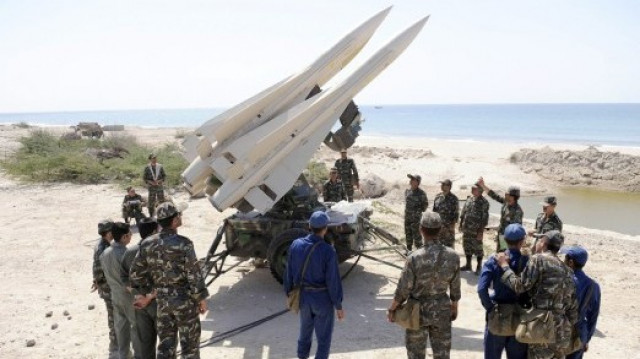US Senate to consider new Iran sanctions
The proposed crippling sanctions are aimed at cutting flow of revenues suspected of supporting the nuclear program.

US Senate to consider new Iran sanctions
The politically popular sanctions are focused on foreign banks that handle transactions for Iran's national oil and tanker companies, and include measures to close loopholes in existing sanctions. The tougher package has secured support from the American Israel Public Affairs Committee, a powerful pro-Israel lobby group, the Democratic aide said.
A senior Republican congressional aide said the bill is expected to pass. "AIPAC has signed off on this and is strongly supporting it and is urging Republicans to do the same," the Democratic leadership aide said. The United States says Iran's nuclear program is a cover for developing the capability to build atomic bombs. Iran says it is for civilian purposes.
The proposed sanctions build on penalties signed into law by President Barack Obama in December that have made it difficult for Tehran, the world's third-largest petroleum exporter, to sell its oil, in a bid to cut the flow of revenues suspected of supporting the nuclear program. The move comes ahead of negotiations beginning next week in Baghdad between Iran and six world powers about Tehran's nuclear program.
"Iran must either willfully commit to terminating its nuclear program or we will force their hand through crippling sanctions," said Democratic Senator Robert Menendez, chief architect of the sanctions.
Tehran is seeking sanctions relief at the talks, but passing the Senate bill will show the US has political support to intensify sanctions, said Mark Dubowitz, head of the Foundation for Defense of Democracies, and an advocate for tougher sanctions on Iran.
Tougher sanctions ahead
The package is based on a bill passed in February by the Senate Banking Committee. The committee proposed that the Society for Worldwide Interbank Financial Telecommunication, or SWIFT, shut out Iran's central bank and other financial institutions from the system used to move money between banks around the world.
Because of the bill, European regulators ordered SWIFT to disconnect designated Iranian financial companies from its messaging system, the first time the electronic payment system had expelled any banks. Reid brought the bill before the Senate in March for a "unanimous consent" voice vote, but that failed because some Republican senators wanted to add provisions, such as sanctions on companies that insure trade with Iran.
The revised package features some changes and one major new provision. It includes sanctions on European satellite companies that provide service to the Iranian government while Tehran jams signals they carry for customers like Voice of America and the BBC seeking to transmit into Iran, another Senate Democratic aide said.
It extends sanctions originally aimed at SWIFT to all financial messaging service providers, and bans third-country entities from accessing electronic banking systems on Tehran's behalf, the aide said. It also adds non-binding provisions urging the Obama administration to impose sanctions on insurers of Iranian oil shipments and to consider new sanctions on shipping companies, the aide said. The Republican-controlled House of Representatives passed its version of the new sanctions package in December. If the Senate agrees to move forward on the bill, the two bodies will need to agree on how to settle differences.
"Senate Democrats have just agreed to open the door to even tougher sanctions during conference negotiations on the bill, particularly those targeting the provision of insurance to Iranian entities, business conducted with or services provided to Iranian energy companies and the extension of sanctions to all Iranian financial institutions," the Republican aide said.
Howard Berman, the top Democrat on the House Foreign Affairs Committee, said tougher sanctions may persuade Iran to end its nuclear program. But he also called on the administration to crack down and enforce sanctions on companies in China that continue to buy, finance and ship Iranian oil.
"It's time - in fact, it's long past time - to impose sanctions on the entities involved in these activities," Berman said in remarks prepared for a hearing on the issue set for Thursday.



















COMMENTS
Comments are moderated and generally will be posted if they are on-topic and not abusive.
For more information, please see our Comments FAQ